A few years ago Nomiki Konst was campaigning for Hillary Clinton and Barack Obama's former vice-president Joe Biden, a centrist who is eyeing a challenge to Donald Trump in 2020. She even tried to stand for election to Congress in Arizona, during which she discovered the somewhat unappealing and mysterious practices of the Democratic Party.
Then came Bernie Sanders. During the Democratic primary campaign Konst, who was born in Tucson, Arizona, in 1984, was one of the spokespeople for the senator from Vermont who was the “socialist” candidate against the former secretary of state Hillary Clinton. After the latteer's defeat at the hands of Trump, Nomiki Konst helped negotiate changes in party rules on behalf of “Bernie”, who had become the new icon of the American Left.
A radio presenter, journalist and activist, Nomiki Konst is now candidate for the position of “Public Advocate” for the city of New York, an elected post in which the holder mediates between the city authorities and grassroots activist groups. Konst, whose Twitter account bears a red rose, is standing as a “socialist”. And doing so with pride in an ultra-capitalist country where the label is an insult for the Right and also repulses many Democrats.
Is a wave of radicalism about to unfurl itself in the United States? More and more Americans think so, despite the triumph of Trump and the American Right. Membership of the Democratic Socialists of America (DSA), to which Sanders is close without being a member himself, has exploded since the last presidential election, from 5,000 to 50,000, with many of them being young or very young.
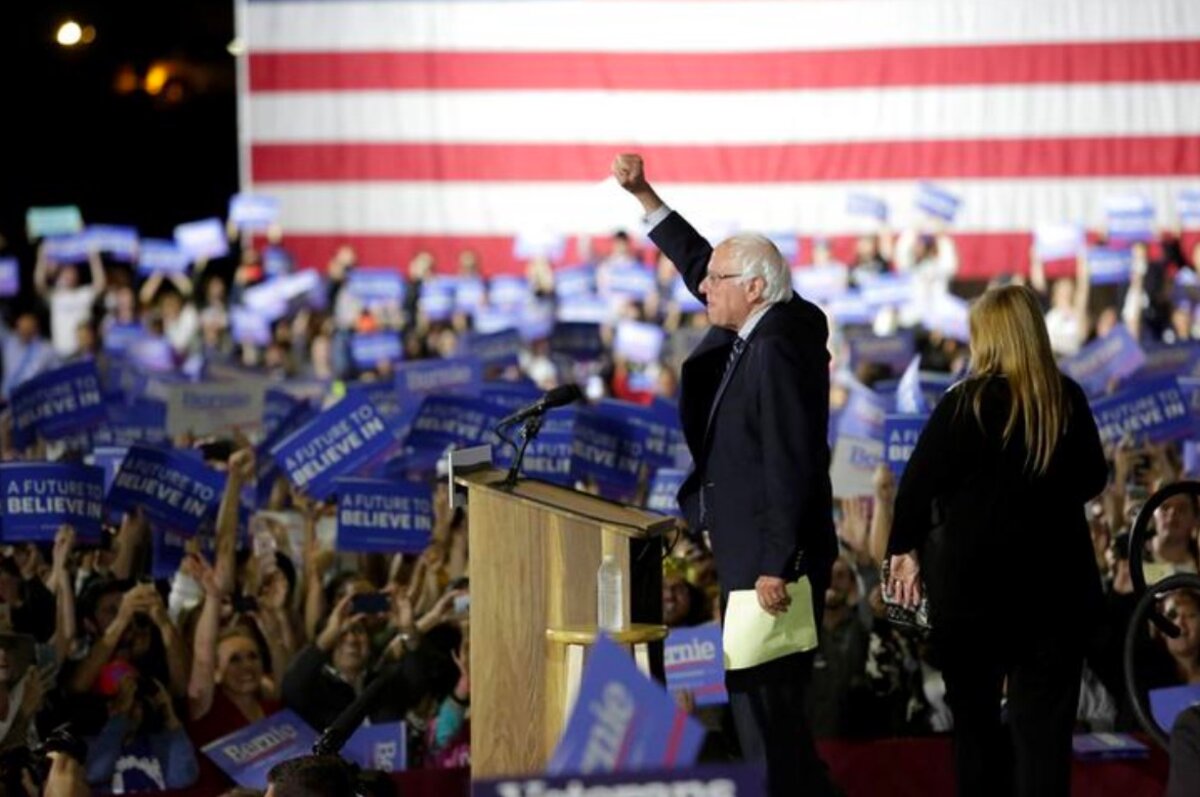
Enlargement : Illustration 1

On November 8th, 2017, exactly a year after Trump's victory, a dozen socialists won in local elections in Virginia, Iowa and Tennessee, doubling the organisation's number of elected representatives overnight. This spring 42 socialists won primary elections, in most cases against Democrats. Two DSA activists, Alexandria Ocasio-Cortez, from New York and Rashida Tlaib, the daughter of Palestinian immigrants from Detroit, are expected to be elected to Congress in the mid-year elections this November. These numbers are still modest and mostly involve the large liberal cities. But they are the highest figures for close to a century.
To define her own “socialism” - or “democratic socialism” to avoid the inevitable flak that goes with that word - Nomini Konst uses very simple vocabulary. “Socialism in a very basic form is fighting for the right to organize. Labour has been under attack for the last 35 years. The bottom line of it is fighting for working people on economic issues, against oligarchs, for transparency, for organizing, giving union, workers, women, minorities, social justice, the power to rise up, to liberate people from their shackles, giving the opportunity to people to survive in what is becoming a very unlivable planet, fighting on housing, climate justice.”
In her view, there is an urgent need for socialism: “Income inequality is so strong right now that we have no choice”. She says: “Socialism has been given an opportunity to flourish and organize in the country because big business has been able to crackdown on our two party system. It’s even not a two-party system anymore, it’s a system of the oligarchs versus the rest of the people.”
Konst notes that until recently Medicare for all was seen as a “crazy idea” but now has “dozens of cosponsors” ahead of the mid-term elections on November 6th. Also, taxing the top 1% wealthiest people more has now become a “mainstream idea” as has greater regulation of Wall Street. “It's the regulation that should have happened after the financial crisis,” she adds.
Nomini Kons continues: “This is the first point in history where criticism of capitalism is catching up in the mainstream. I give a lot of credit to Sanders who not only mainstreamed the idea of democratic socialism but he also gave a stage to so many people to talk about economic issues. A lot of millennials understand that overconsumption is no longer viable, they see their parents bankrupt, they know this model is collapsing.”
Undoubtedly the standout figure in the new guard on the Left is a 28-years-old who is already known just by her initials, 'AOC', standing for Alexandria Ocasio-Cortez. Only a year ago this DSA member, whose parents are Puerto Ricans, was a waitress in a taco restaurant in Manhattan. She lives in a small flat in the Bronx and has juggled up to three jobs at a time to pay off the family's debt after her father's death. To general surprise, on June 26th this year, during the primary for the House of Representatives Ocasio-Cortez convincingly beat a leading Democrat Joe Crowley. He has been elected for the last 20 years in the working class majority Hispanic district of the Bronx and Queens and was known for conflicts of interests over property in a city hammered by the explosion in the level of rents.
On that evening 'AOC' held her head in her hands, incredulous in front of the television screen. An impressive speaker, this telegenic New Yorker born in 1989 had become a star overnight. She represents the rise of the Left to such a point that she instantly attracted attacks from the pro-Trump Fox News. Over the summer she toured across the United States supporting Democrat candidates ahead of the elections, including in conservative Kansas and Missouri.
In her campaign clip (see below), which is a declaration of war on the Democrat establishment, AOC says: “Women like me aren't supposed to run for office ... This race is about people versus money. We've got people, they've got money.”
Alexandria Ocasio-Cortez ran an open campaign that was anchored on the left. Speaking in an Hispanic restaurant in the Bronx where she gathered together campaign volunteers for yet another round of canvassing, she extolled the virtues of direct contact with the voters. For her it is “not just about winning elections, it's about advancing a movement”.
She backs universal healthcare, a “green New Deal” which is “100% sustainable”, a jobs guarantee, a major reform of the prison and judicial systems which criminalise minorities the most and the abolition of the US's Immigration and Customs Enforcement (ICE) agency which “makes people afraid to open their door”. This approach prompts warnings from many liberals and centrists in the Democratic Party, who still see AOC's victory as an exception. “I don't think you can go too far to the left and win the Midwest,” one centrist Democrat senator says.
But Ocasio-Cortez says she is only one part of a much wider movement. In comparison with the last primaries she says they have “considerably expanded the electorate, standing up for bold policies that speak directly to the most disaffected and the most disenchanted” she told her volunteers, who were all dressed in violet and yellow tee shirts, the colours of her campaign.
She said: “Often it is at moments like these when our deepest problems in society are not being acknowledged honestly that movements start to get loud. We challenge power and its political machines. We are a testing point for this nation, NY 14th [editor's note, her district] is overwhelmingly working class. Some 70% are people of colour. We're going to change the country from here.”
Speaking with optimism, inclusively, and with no trace of aggression, Ocasio-Cortez takes on board the analysis used by Bernie Sanders in his campaign; that this is an alliance of those who struggle to get by on their wages against the rich. “What we talked about has resonated with the entire country because we reject the artificial spectrum of left and right. We know that our politics are about up and down. We know that when we fight for the economic social and racial dignity of all people we can bring people together and we did, and this is exactly what we did,” she said, describing her win on June 26th.
'Political imagination is expanding'
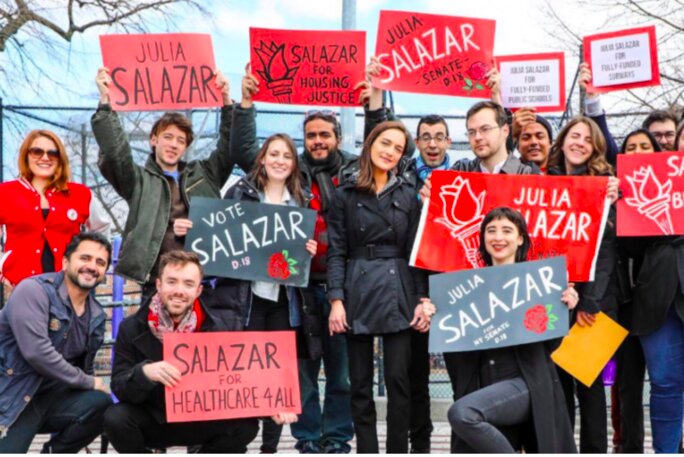
Enlargement : Illustration 3

The other DSA political sensation of the moment is Julia Salazar. Aged 28, this former Republican who was born in Florida and who as a student campaigned against abortion, is today a committed feminist. She is known for her work in defending sex workers and also her support for the Boycott, Divestment, Sanctions (BDS) movement on the boycott of Israeli goods. It's a campaign supported by the DSA but not Bernie Sanders and is attacked by most Democrats.
In September Salazar won her primary for the Senate in New York against an incumbent Democrat by basing her campaign on the protection of tenants in Bushwick, an area of Brooklyn where rampant gentrification has pushed up rents. She should be elected easily on November 6th.
According to Salazar the socialist label is no longer a handicap. “People don't even blink if we talk about the DSA. Often, in the media in general, socialism is a created as a taboo term but I think that among the electorate people are not afraid of it and people are increasingly curious about it.” She adds: “ People are fed up with politics as usual and we are all tired of being given only two bad options. Political imagination is expanding.”
Elizabeth McKillen, professor of history at the University of Maine, looks at this revival of socialism with some irony. “People forget that the United States has a socialist past,” she says, and one which matched the movement in Europe at the time. In 1912 Eugene Debs, the leader of the Socialist Party of America set up nine years earlier, got 6% of the votes in the presidential election. “Which was not so bad for a third party candidate in the US,” says the historian. “[The party had] two socialist congressmen during that period; a lot of mayors and state legislators. For a time it appeared as though the US Socialist Party would be as strong as European parties.”
The party's decline came soon afterwards. It was very opposed to involvement in World War I and faced repression; and Debs himself was imprisoned, while President Woodrow Wilson took some of his ideas. Meanwhile some supporters found the party too soft and became communists. “At the end of the war the party divided into many directions and was never again as strong as it had been,” says McKillen. Later, during the Cold War era and McCarthyism, the party suffered from the “red hysteria” and this drove socialists in the US to become more conservative. The protests against American involvement in Vietnam led to new groups and fresh divisions developing.
The current DSA, which is a 'big tent' on the Left mixing activists, social-democrats, advocates for the end of capitalism, anarchists and libertarians, was created in 1982. At the time it was led by the intellectuals Barbara Ehrenreich and Michael Harrington; Harrington had inspired Martin Luther King. Martin Luther King was himself a socialist and called for equality of rights and “social justice” and supported “radical social democracy” under which the state would redistribute wealth, bring in a minimum guaranteed wage and take people out of poverty.
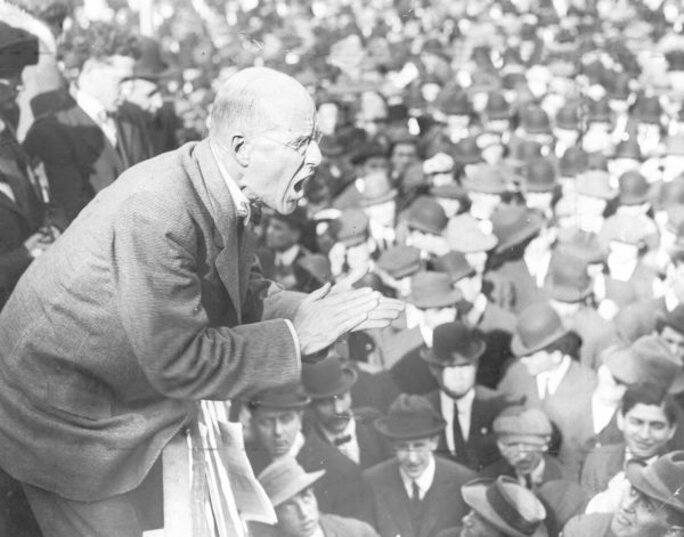
Enlargement : Illustration 4

For many years the DSA – which is not a political party – stayed under the radar as an organisation. The journalist George Packer has described what it was like to be a DSA member in the 1990s. “It was marginal, pedestrian work, based on the eternal postponement of gratification: three-hour board meetings in a narrow room in a church basement; a two-year fund drive to buy a used computer; a snowbound forum on the Canadian left, whose announcement reached most of the membership too late because the non-profit mailing wasn’t sorted properly. The word 'Sisyphean' is misleading, since we never pushed our rock anywhere close to the top,” he wrote.
For years the word “socialist” was anathema for all conservative politicians, and was used variously to describe any attempts to raise public spending, to label Cuba and to attack the policies – however cautions – of Barack Obama. According to the intellectual Michael Kazin, history professor at Georgetown University, and co-editor of the well-known left-wing review Dissent, “most Americans don't know what it means” to be a socialist. Attempts to portray socialists as “people who want to tear down religion, businesses” can still be successful, he says.
After a gap of 20 years Kazin himself returned to the DSA “out of solidarity” after Trump's victory. With hindsight he considers that the socialist label probably cost Sanders his victory against Clinton in the primaries. But he is grateful to Sanders for having rehabilitated the word and having defined a “positive agenda”, at a time when the Democrats “don't know what they stand for”.
“Socialism is in fashion!” says Dan La Botz with a smile. This academic and trade union activist invited Mediapart for a coffee in his flat in a working class area of Brooklyn, where the living room is full of books on Latin America. A figure on the left in the DSA in New York, a former journalist in Mexico and the co-founder of the Teamsters for a Democratic Union (TDU), La Botz has seen many new members join since Trump's election win. Unlike many in the DSA he rejects electoral deals with the Democratic Party and calls for the public control of banks and large companies. “Socialism has become a popular notion,” he says. “Against that it's become more difficult to define.”
La Batz points out that during his campaign Bernie Sanders did not propose the collective control of the means of production or the end of capitalism. “For him, socialism is Franklin D. Roosevelt's New Deal and Lyndon Johnson's Great Society; the regulating of capitalism, Keynesian economic stimulus, social programmes. The majority of new members also follow this line.” Michael Kazin, who describes himself as one of the “pragmatists” in the DSA, says that in fact Sanders was proposing social democracy. “But he didn't use this word because no one understands it!”.
There are many divergent strategies and policies in the world of American socialists, a world whose borders have suddenly got bigger. Some consider that they must not compromise with a Democratic Party which they consider too corrupt and close to economic interests and should focus instead on activism, whether it be environmental, against monopoly companies, for minimum wages, on LGBT rights, illegal immigrants, on police violence or, more recently, on the nomination of judge Brett Kavanaugh to the Supreme Court.
Others, however, are in favour of carrying out the fight from the inside, in taking part as much as possible in Democratic primaries. A group based around the neo-Marxist review Jacobin want to see the overthrow of capitalism one day but already want to see Bernie Sanders as a candidate against Donald Trump in 2020. This is because he is the furthest to the left of any candidates likely to beat Trump, in a political system which is completely locked up by the two main parties. Some close allies of Sanders, who could declare his candidature after the mid-term elections, are also members of or close to the DSA.
'Local solutions'
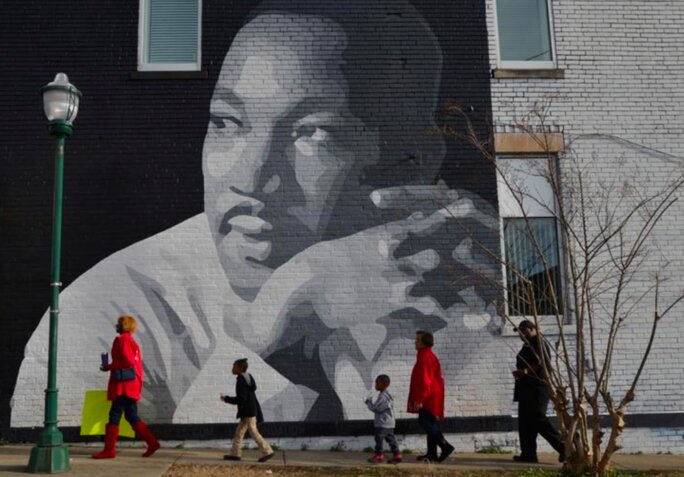
Enlargement : Illustration 5

Living six hours by road from Manhattan, Brian Nowak does not really have the bearded hipster look that you find in DSA gatherings in Brooklyn. For the last year Nowak, who has just turned 30, has been a member of the town board in Cheektowaga, a town of 88,000 people in the suburbs of Buffalo and in the north of New York State. In 2015 he was working in the local supermarket chain store '7-Eleven' when Bernie Sanders launched his campaign. “He was somebody I was following since college,” says Nowak, who campaigned for him, not believing he would get more than 5% of the vote. “I was surprised by his score, I thought the socialist label would frighten a lot of people away.”
In April 2016 in the Democratic Party primary Sanders polled more than Clinton in Cheektowaga. Seventh months later Trump won more votes that Clinton in a town where incomes are below the national average. “He is the first Republican since 1984 to win my town,” says Nowak. “People here see themselves as middle class, they are working class or working poor. They see themselves as hard workers and they are. Some Trump supporters support the president but understand the need for healthcare and for the minimum wage to be increased. And they know that the financial system has a real problem. There has to be a reset.”
In 2016 Nowak was involved in the setting up of a DSA branch in his town, and then he stood for the town board. He says he is not afraid to tell people he is not a capitalist. “People know that when 40% of the USA's fortune is in the hands of few people that’s a problem. We talk about democracy all the time in America but there's no democracy, you go to work, you have orders from your boss, you have very little of what you produced, even with the unions.” He continues: “People know that instinctively. It’s just that when you propose to use the federal government to solve these problems they become sceptical or wary, so I talk them about more local solutions, more employee stock options, more cooperatives, more credit unions, the kind of thing that is more cooperative, and they like the idea of local control.”
Each DSA candidate to whom Mediapart spoke told the same story. They spoke of their anger over the economic and racial injustices that has led to them getting politically involved, in some cases well before Trump's victory. They talked, too, of the battle against the Democratic “machine”.
Jovanka Beckles from Richmond in California is a mental health professional, lesbian and “immigrant”. As a Councilmember for Richmond City she has led an emblematic battle against the oil group Chevron and is fighting against the high cost of rents in the San Francisco region. “People over profits” is her slogan for a seat on the California State Assembly in the elections on November 6th, in which she is fighting against a woman, Buffy Wicks, who worked for Barack Obama and Hillary Clinton. Wicks is backed by the Democratic Party leadership and, according to Beckles, is financed “by the same billionaires who donated to Republicans”.
In Pittsburgh, the major industrial city in Pennsylvania, Summer Lee's experiences also reflect the same frustrations with the Democratic Party and the way American politics is currently conducted. At the mid-term elections Lee, aged 30 and a DSA member, is all but certain to be elected to the state Senate in Pennsylvania. The young lawyer from a working class background, who like millions of young Americans has been saddled with a gigantic student debt – up to 200,000 dollars in her case – says she entered politics “out of necessity”. She says: “It was kind of realizing not being in politics has been to the disadvantage of my community – black people in the United States.”
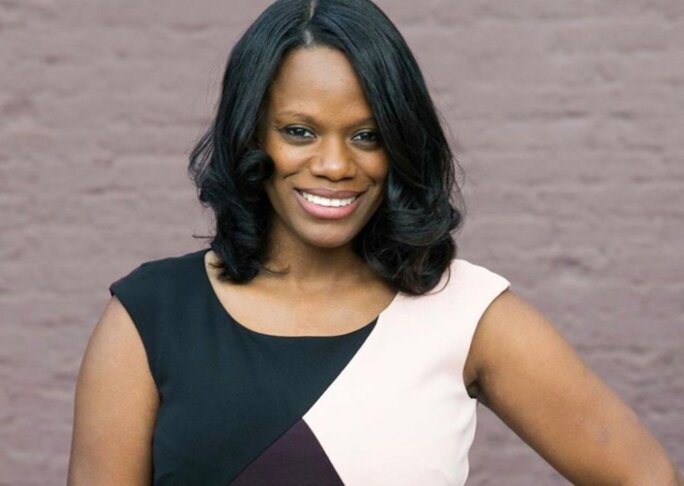
Enlargement : Illustration 6

Summer Lee continues: “I don't come from a political family. A lot of people running right now say my dad's in the union, my mam is a teacher ...that's not my background at all. In my community we don’t talk a lot about politics, in a way that is active. We're at the whim of politicians who never look like us, never grow up around us, never share their perspective, they don’t live on our side of their tracks. Entering into politics was kind of about taking an active role and shaping the politics in our community,” she says. “I don’t have the luxury to sit out of politics now. I don’t have that privilege.”
In the primary election, held on May 15th this year, she beat Paul Costa, a veteran figure in the Democratic Party and a member of Pennsylvania's House of Representatives since 1999. It was due to a door-to-door campaign financed, as were those by Sanders, Ocasio, Salazar and others, by individual donations and not through funding from large companies, whom the Democratic Party routinely solicit for funds.
Summer Lee says of her Democratic opponent in the primary: “His entire family is in politics. Three generations of politicians. In Pittsburgh there are a lot of family dynasties, they fund each other, network with each other. Democrats are not progressive at all.” She adds: “They were the darlings of the party.” On the same day that Summer Lee won her primary, another young socialist, Sara Innamorato, who talked during her campaign of the problems her family suffered from her father's addiction to opiates, won a primary in another district of the city.
The presence of Trump in the White House has galvanised volunteers and helped her campaign, Lee says. But for her the roots of the anger go deeper. For example, she points to the fact that her district has “the worst air quality in the country, one of the highest cancer rates in the country”. She says that how to define socialism is a “conundrum”. For her, democratic socialism is about “worker and people-centred politics, de-emphasizing capitalism and corporatism in a country where income inequality and gender inequality and racial inequality are rampant and a lot of that comes from the fact that the economic system is ill equipped to address these issues. We have a system that values CEO’s and corporations instead of the workers,” says Summer Lee.
“What's important is people over profit and I don’t think it matters what you call it.” She concludes: “People want progressive politics, education, they absolutely want healthcare, they absolutely want clean air, wage equality - they just don’t know how to do it, how to get it. This is the first time people are getting our narrative.”
------------------------------------------------------------------------------------------------------
- The original French article can be found here.
English version by Michael Streeter


